Ethical International Business: Fast Fashion Challenges
VerifiedAdded on 2021/02/21
|6
|1171
|91
Report
AI Summary
This report delves into the ethical landscape of the fast fashion industry, examining the political and economic challenges it faces. It highlights issues such as exploitation of workers, environmental damage, and the lack of government intervention. The report discusses improvements in business activities, including the adoption of ethical rules and regulations and the provision of fair wages. It provides examples of companies that exemplify both ethical and unethical behavior, such as H&M and Zara, which are praised for their transparency and fair labor practices, and Marks & Spencer and Nike, which are criticized for unethical practices. The report emphasizes the importance of ethical behavior for building brand image and ensuring long-term sustainability in the fashion industry. The analysis draws on various academic sources, including journal articles and doctoral dissertations, to support its findings and recommendations.
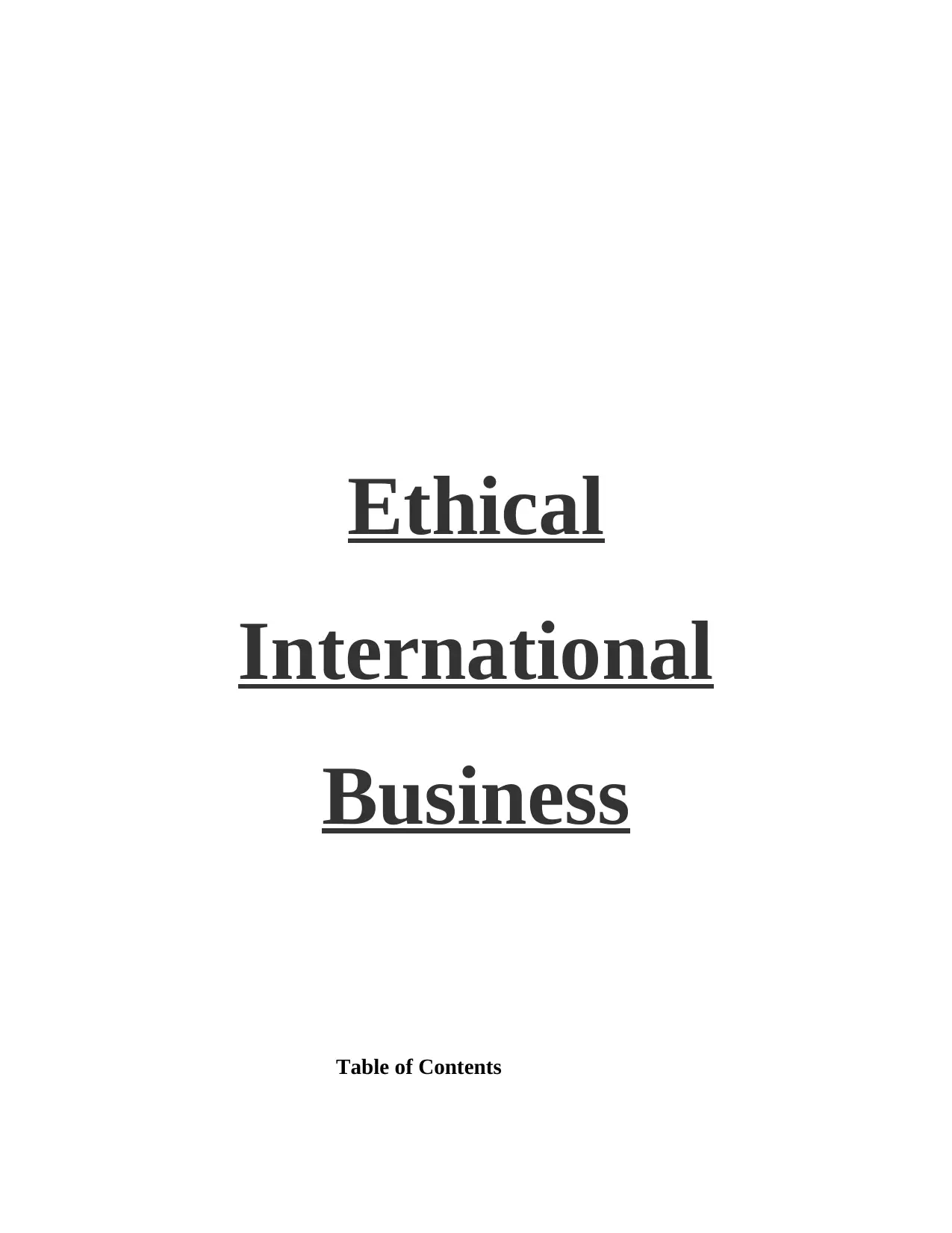
Ethical
International
Business
Table of Contents
International
Business
Table of Contents
Paraphrase This Document
Need a fresh take? Get an instant paraphrase of this document with our AI Paraphraser
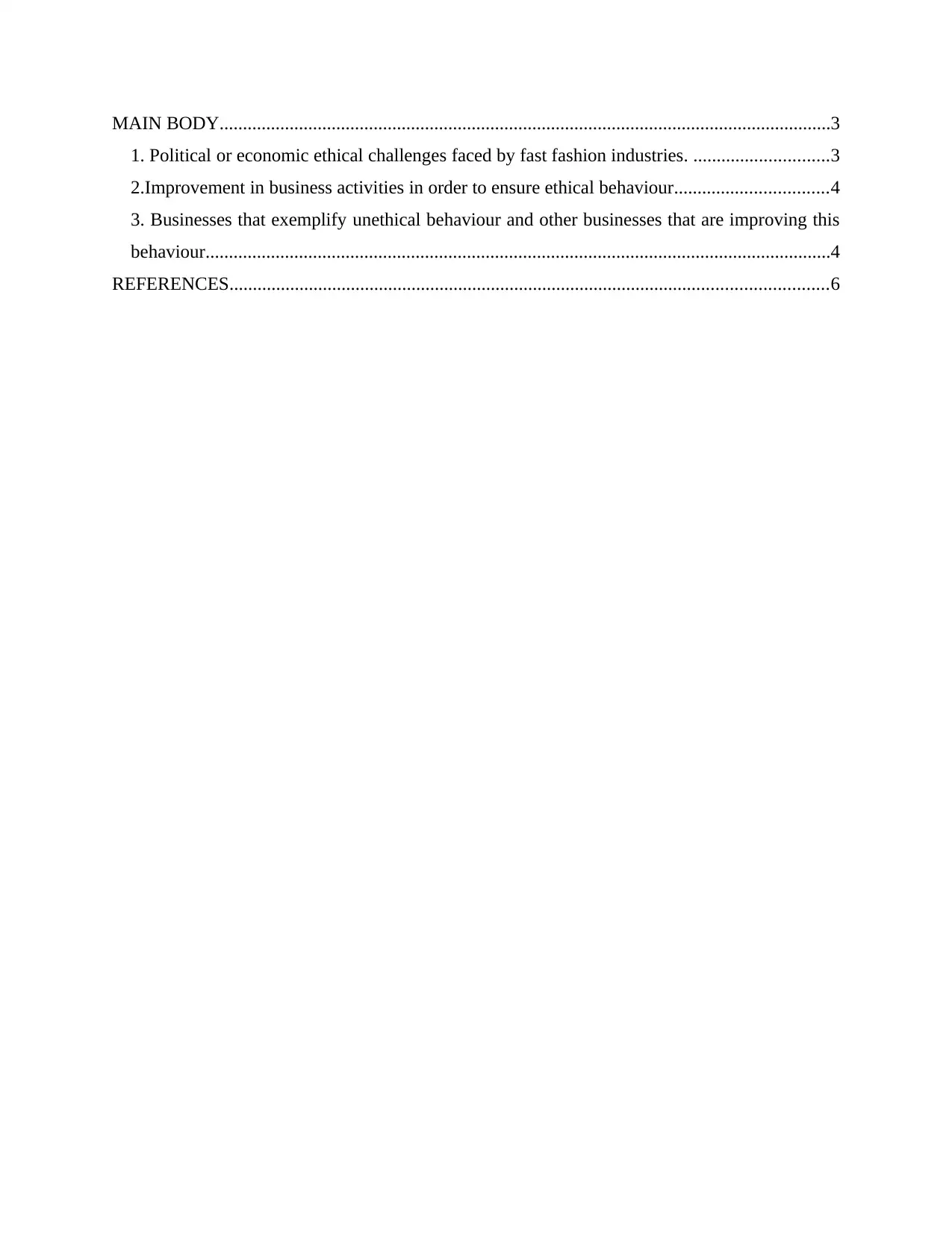
MAIN BODY...................................................................................................................................3
1. Political or economic ethical challenges faced by fast fashion industries. .............................3
2.Improvement in business activities in order to ensure ethical behaviour.................................4
3. Businesses that exemplify unethical behaviour and other businesses that are improving this
behaviour......................................................................................................................................4
REFERENCES................................................................................................................................6
1. Political or economic ethical challenges faced by fast fashion industries. .............................3
2.Improvement in business activities in order to ensure ethical behaviour.................................4
3. Businesses that exemplify unethical behaviour and other businesses that are improving this
behaviour......................................................................................................................................4
REFERENCES................................................................................................................................6
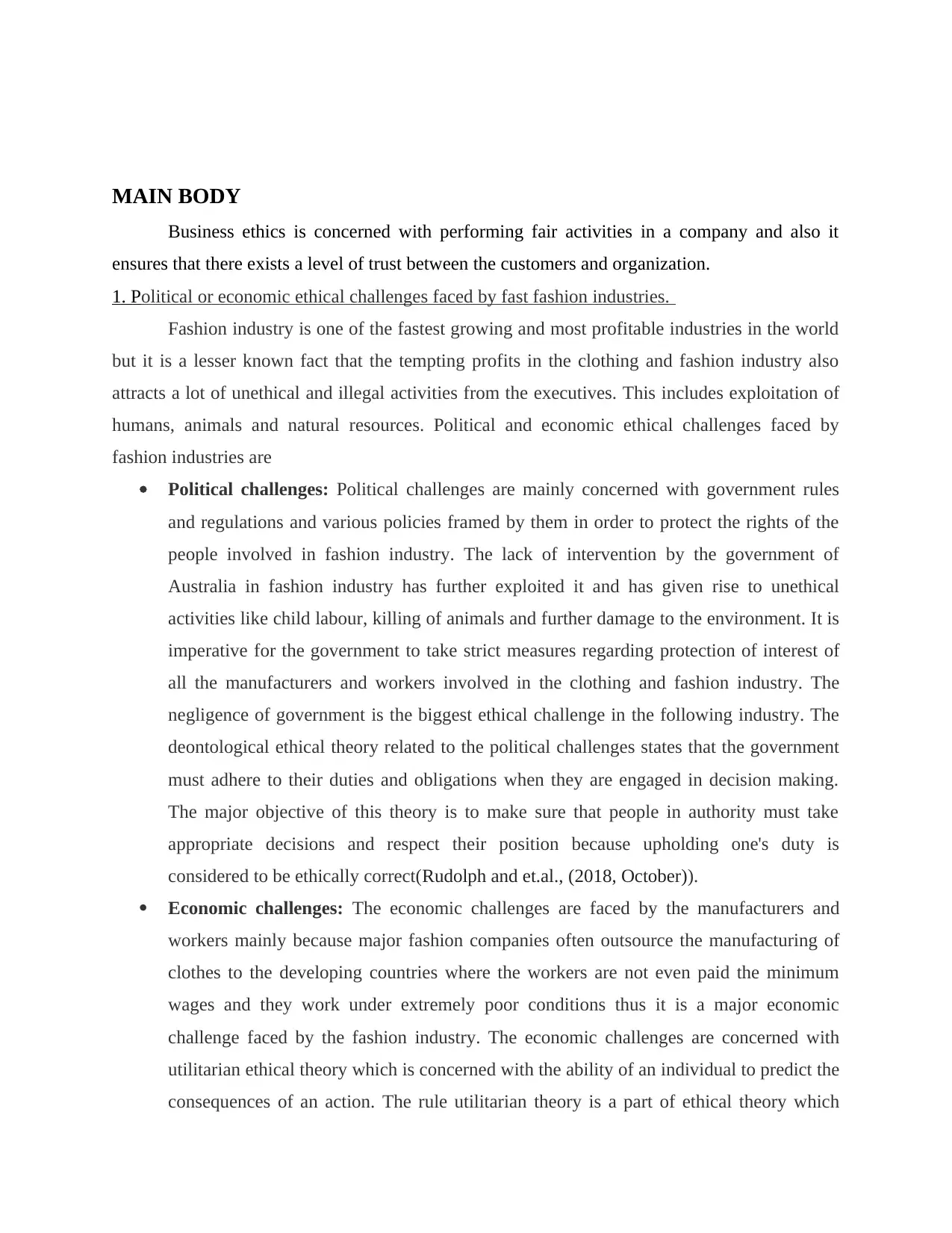
MAIN BODY
Business ethics is concerned with performing fair activities in a company and also it
ensures that there exists a level of trust between the customers and organization.
1. Political or economic ethical challenges faced by fast fashion industries.
Fashion industry is one of the fastest growing and most profitable industries in the world
but it is a lesser known fact that the tempting profits in the clothing and fashion industry also
attracts a lot of unethical and illegal activities from the executives. This includes exploitation of
humans, animals and natural resources. Political and economic ethical challenges faced by
fashion industries are
Political challenges: Political challenges are mainly concerned with government rules
and regulations and various policies framed by them in order to protect the rights of the
people involved in fashion industry. The lack of intervention by the government of
Australia in fashion industry has further exploited it and has given rise to unethical
activities like child labour, killing of animals and further damage to the environment. It is
imperative for the government to take strict measures regarding protection of interest of
all the manufacturers and workers involved in the clothing and fashion industry. The
negligence of government is the biggest ethical challenge in the following industry. The
deontological ethical theory related to the political challenges states that the government
must adhere to their duties and obligations when they are engaged in decision making.
The major objective of this theory is to make sure that people in authority must take
appropriate decisions and respect their position because upholding one's duty is
considered to be ethically correct(Rudolph and et.al., (2018, October)).
Economic challenges: The economic challenges are faced by the manufacturers and
workers mainly because major fashion companies often outsource the manufacturing of
clothes to the developing countries where the workers are not even paid the minimum
wages and they work under extremely poor conditions thus it is a major economic
challenge faced by the fashion industry. The economic challenges are concerned with
utilitarian ethical theory which is concerned with the ability of an individual to predict the
consequences of an action. The rule utilitarian theory is a part of ethical theory which
Business ethics is concerned with performing fair activities in a company and also it
ensures that there exists a level of trust between the customers and organization.
1. Political or economic ethical challenges faced by fast fashion industries.
Fashion industry is one of the fastest growing and most profitable industries in the world
but it is a lesser known fact that the tempting profits in the clothing and fashion industry also
attracts a lot of unethical and illegal activities from the executives. This includes exploitation of
humans, animals and natural resources. Political and economic ethical challenges faced by
fashion industries are
Political challenges: Political challenges are mainly concerned with government rules
and regulations and various policies framed by them in order to protect the rights of the
people involved in fashion industry. The lack of intervention by the government of
Australia in fashion industry has further exploited it and has given rise to unethical
activities like child labour, killing of animals and further damage to the environment. It is
imperative for the government to take strict measures regarding protection of interest of
all the manufacturers and workers involved in the clothing and fashion industry. The
negligence of government is the biggest ethical challenge in the following industry. The
deontological ethical theory related to the political challenges states that the government
must adhere to their duties and obligations when they are engaged in decision making.
The major objective of this theory is to make sure that people in authority must take
appropriate decisions and respect their position because upholding one's duty is
considered to be ethically correct(Rudolph and et.al., (2018, October)).
Economic challenges: The economic challenges are faced by the manufacturers and
workers mainly because major fashion companies often outsource the manufacturing of
clothes to the developing countries where the workers are not even paid the minimum
wages and they work under extremely poor conditions thus it is a major economic
challenge faced by the fashion industry. The economic challenges are concerned with
utilitarian ethical theory which is concerned with the ability of an individual to predict the
consequences of an action. The rule utilitarian theory is a part of ethical theory which
⊘ This is a preview!⊘
Do you want full access?
Subscribe today to unlock all pages.

Trusted by 1+ million students worldwide
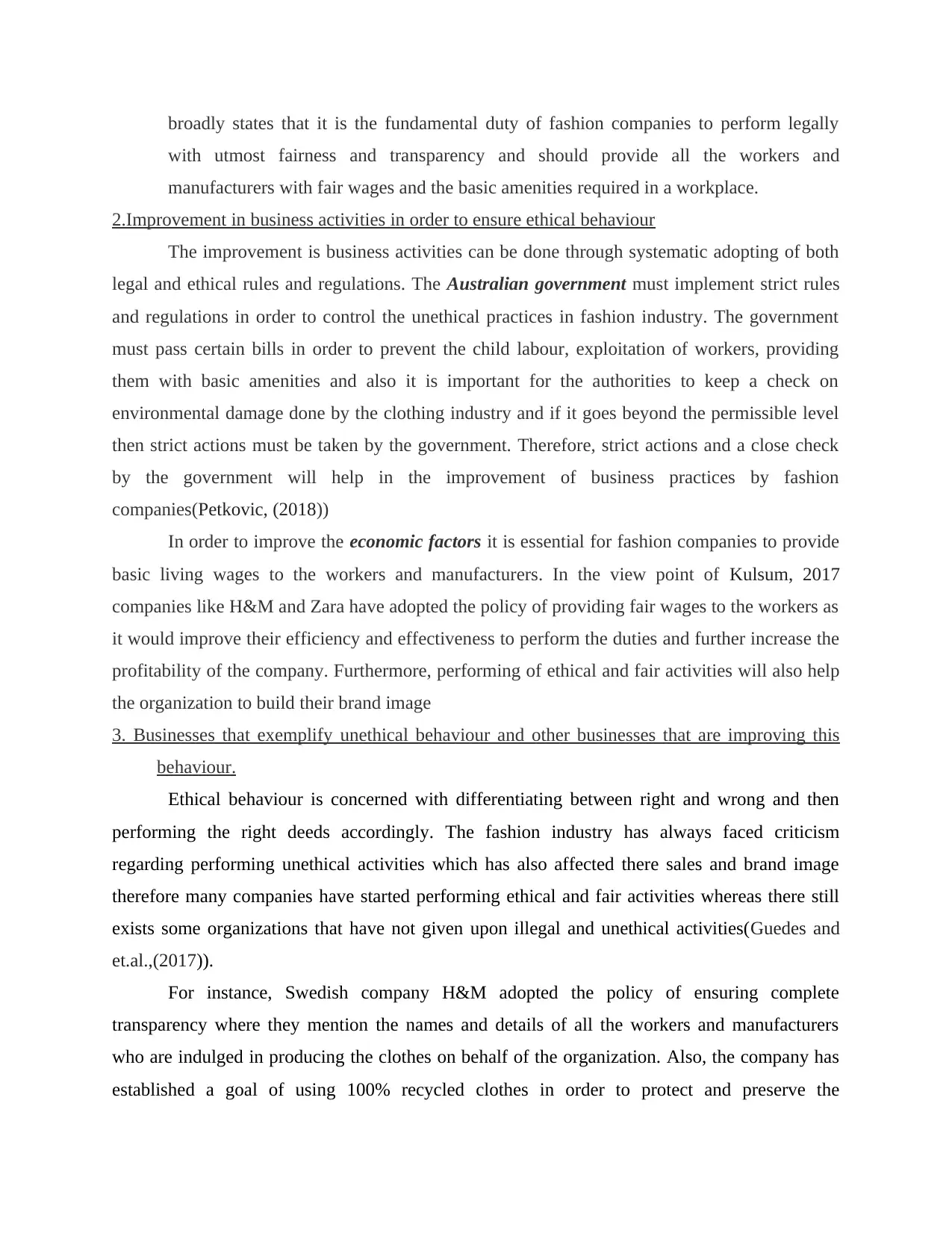
broadly states that it is the fundamental duty of fashion companies to perform legally
with utmost fairness and transparency and should provide all the workers and
manufacturers with fair wages and the basic amenities required in a workplace.
2.Improvement in business activities in order to ensure ethical behaviour
The improvement is business activities can be done through systematic adopting of both
legal and ethical rules and regulations. The Australian government must implement strict rules
and regulations in order to control the unethical practices in fashion industry. The government
must pass certain bills in order to prevent the child labour, exploitation of workers, providing
them with basic amenities and also it is important for the authorities to keep a check on
environmental damage done by the clothing industry and if it goes beyond the permissible level
then strict actions must be taken by the government. Therefore, strict actions and a close check
by the government will help in the improvement of business practices by fashion
companies(Petkovic, (2018))
In order to improve the economic factors it is essential for fashion companies to provide
basic living wages to the workers and manufacturers. In the view point of Kulsum, 2017
companies like H&M and Zara have adopted the policy of providing fair wages to the workers as
it would improve their efficiency and effectiveness to perform the duties and further increase the
profitability of the company. Furthermore, performing of ethical and fair activities will also help
the organization to build their brand image
3. Businesses that exemplify unethical behaviour and other businesses that are improving this
behaviour.
Ethical behaviour is concerned with differentiating between right and wrong and then
performing the right deeds accordingly. The fashion industry has always faced criticism
regarding performing unethical activities which has also affected there sales and brand image
therefore many companies have started performing ethical and fair activities whereas there still
exists some organizations that have not given upon illegal and unethical activities(Guedes and
et.al.,(2017)).
For instance, Swedish company H&M adopted the policy of ensuring complete
transparency where they mention the names and details of all the workers and manufacturers
who are indulged in producing the clothes on behalf of the organization. Also, the company has
established a goal of using 100% recycled clothes in order to protect and preserve the
with utmost fairness and transparency and should provide all the workers and
manufacturers with fair wages and the basic amenities required in a workplace.
2.Improvement in business activities in order to ensure ethical behaviour
The improvement is business activities can be done through systematic adopting of both
legal and ethical rules and regulations. The Australian government must implement strict rules
and regulations in order to control the unethical practices in fashion industry. The government
must pass certain bills in order to prevent the child labour, exploitation of workers, providing
them with basic amenities and also it is important for the authorities to keep a check on
environmental damage done by the clothing industry and if it goes beyond the permissible level
then strict actions must be taken by the government. Therefore, strict actions and a close check
by the government will help in the improvement of business practices by fashion
companies(Petkovic, (2018))
In order to improve the economic factors it is essential for fashion companies to provide
basic living wages to the workers and manufacturers. In the view point of Kulsum, 2017
companies like H&M and Zara have adopted the policy of providing fair wages to the workers as
it would improve their efficiency and effectiveness to perform the duties and further increase the
profitability of the company. Furthermore, performing of ethical and fair activities will also help
the organization to build their brand image
3. Businesses that exemplify unethical behaviour and other businesses that are improving this
behaviour.
Ethical behaviour is concerned with differentiating between right and wrong and then
performing the right deeds accordingly. The fashion industry has always faced criticism
regarding performing unethical activities which has also affected there sales and brand image
therefore many companies have started performing ethical and fair activities whereas there still
exists some organizations that have not given upon illegal and unethical activities(Guedes and
et.al.,(2017)).
For instance, Swedish company H&M adopted the policy of ensuring complete
transparency where they mention the names and details of all the workers and manufacturers
who are indulged in producing the clothes on behalf of the organization. Also, the company has
established a goal of using 100% recycled clothes in order to protect and preserve the
Paraphrase This Document
Need a fresh take? Get an instant paraphrase of this document with our AI Paraphraser
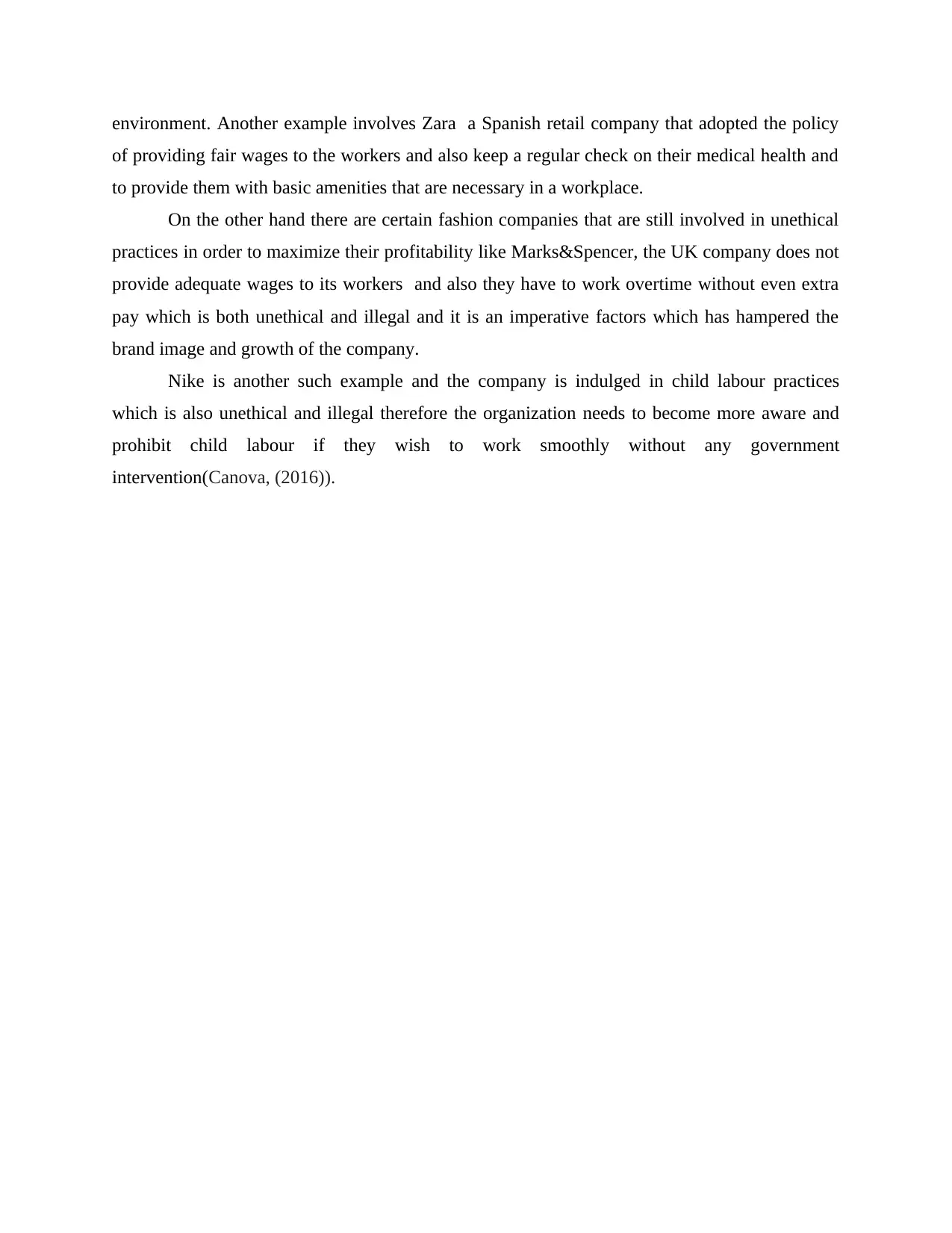
environment. Another example involves Zara a Spanish retail company that adopted the policy
of providing fair wages to the workers and also keep a regular check on their medical health and
to provide them with basic amenities that are necessary in a workplace.
On the other hand there are certain fashion companies that are still involved in unethical
practices in order to maximize their profitability like Marks&Spencer, the UK company does not
provide adequate wages to its workers and also they have to work overtime without even extra
pay which is both unethical and illegal and it is an imperative factors which has hampered the
brand image and growth of the company.
Nike is another such example and the company is indulged in child labour practices
which is also unethical and illegal therefore the organization needs to become more aware and
prohibit child labour if they wish to work smoothly without any government
intervention(Canova, (2016)).
of providing fair wages to the workers and also keep a regular check on their medical health and
to provide them with basic amenities that are necessary in a workplace.
On the other hand there are certain fashion companies that are still involved in unethical
practices in order to maximize their profitability like Marks&Spencer, the UK company does not
provide adequate wages to its workers and also they have to work overtime without even extra
pay which is both unethical and illegal and it is an imperative factors which has hampered the
brand image and growth of the company.
Nike is another such example and the company is indulged in child labour practices
which is also unethical and illegal therefore the organization needs to become more aware and
prohibit child labour if they wish to work smoothly without any government
intervention(Canova, (2016)).
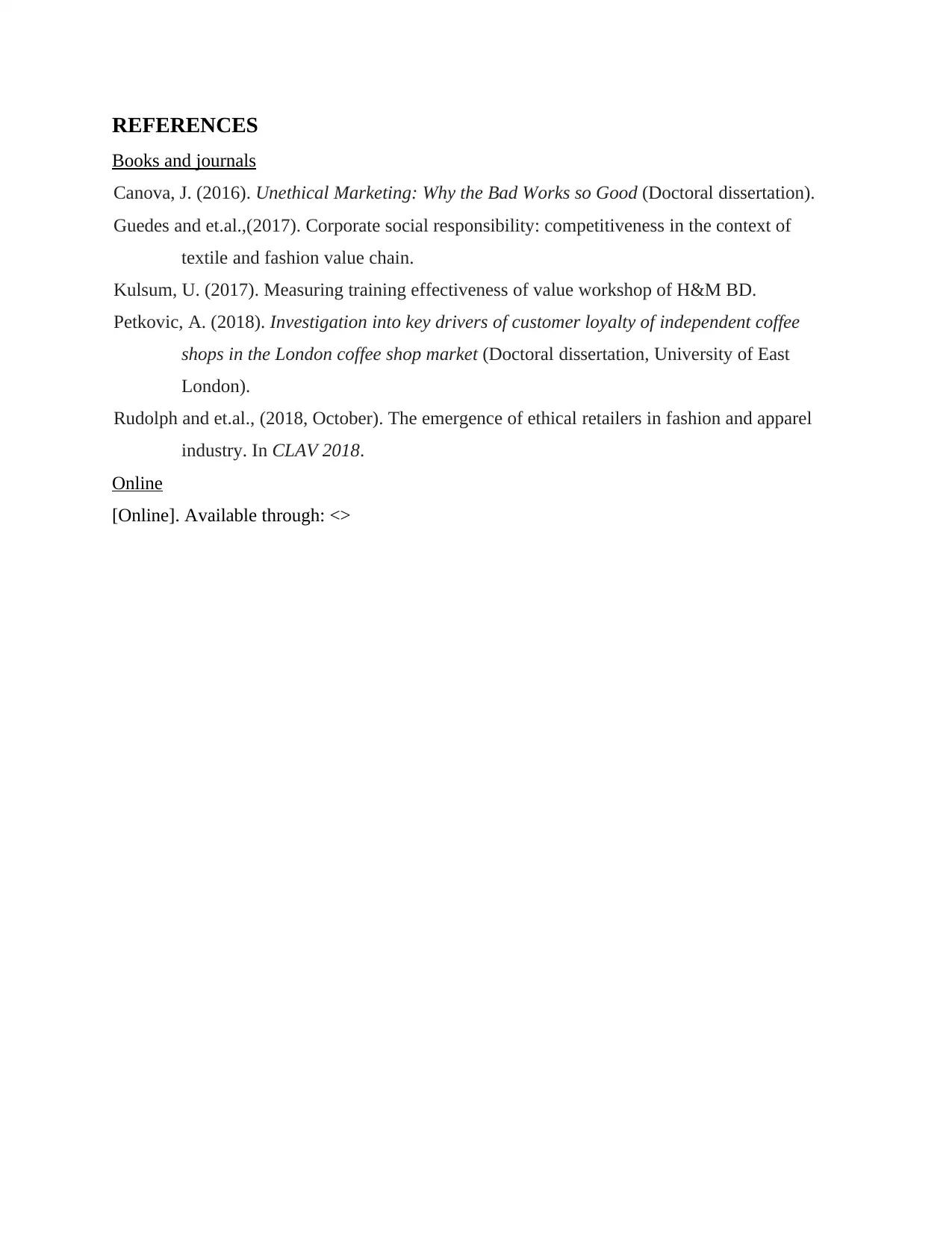
REFERENCES
Books and journals
Canova, J. (2016). Unethical Marketing: Why the Bad Works so Good (Doctoral dissertation).
Guedes and et.al.,(2017). Corporate social responsibility: competitiveness in the context of
textile and fashion value chain.
Kulsum, U. (2017). Measuring training effectiveness of value workshop of H&M BD.
Petkovic, A. (2018). Investigation into key drivers of customer loyalty of independent coffee
shops in the London coffee shop market (Doctoral dissertation, University of East
London).
Rudolph and et.al., (2018, October). The emergence of ethical retailers in fashion and apparel
industry. In CLAV 2018.
Online
[Online]. Available through: <>
Books and journals
Canova, J. (2016). Unethical Marketing: Why the Bad Works so Good (Doctoral dissertation).
Guedes and et.al.,(2017). Corporate social responsibility: competitiveness in the context of
textile and fashion value chain.
Kulsum, U. (2017). Measuring training effectiveness of value workshop of H&M BD.
Petkovic, A. (2018). Investigation into key drivers of customer loyalty of independent coffee
shops in the London coffee shop market (Doctoral dissertation, University of East
London).
Rudolph and et.al., (2018, October). The emergence of ethical retailers in fashion and apparel
industry. In CLAV 2018.
Online
[Online]. Available through: <>
⊘ This is a preview!⊘
Do you want full access?
Subscribe today to unlock all pages.

Trusted by 1+ million students worldwide
1 out of 6
Related Documents
Your All-in-One AI-Powered Toolkit for Academic Success.
+13062052269
info@desklib.com
Available 24*7 on WhatsApp / Email
![[object Object]](/_next/static/media/star-bottom.7253800d.svg)
Unlock your academic potential
Copyright © 2020–2026 A2Z Services. All Rights Reserved. Developed and managed by ZUCOL.





